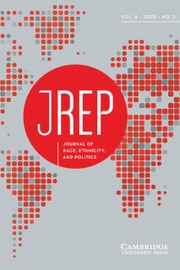Article contents
Toward a decolonial quantitative political science: Indigenous self-identification in the 2019 Native Hawaiian Survey
Published online by Cambridge University Press: 01 March 2022
Abstract
Indigenous scholars have much to teach political scientists about recognizing and addressing the ways in which power, politics, and colonialism irrevocably shape the data-generating process. In this article, we present a methodological framework for a decolonial quantitative political science, outlining how it was operationalized in the design and execution of the 2019 Native Hawaiian Survey. We demonstrate the utility of this methodological framework through a descriptive analysis of Native Hawaiian respondents' self-identification. Aligned with the theoretical insights of kanaka (Native Hawaiian) scholars, we provide empirical support for the intertwined political relationship between Native Hawaiian identity and national identity––a finding that demands further empirical study among all Indigenous populations. This article offers two main contributions. First, it provides a methodological framework to guide quantitative political science research on Indigenous populations. Second, it adds empirically to the growing literature on Indigenous self-identification.
- Type
- Research Article
- Information
- Copyright
- Copyright © The Author(s), 2022. Published by Cambridge University Press on behalf of The Race, Ethnicity, and Politics Section of the American Political Science Association
References
- 9
- Cited by




